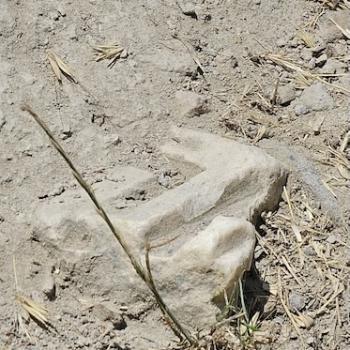One of the more important and neglected extra canonical but very early Christian books is the Didache. There is now a gigantic Hermeneia commentary on it, so one would expect more discussion of this interesting early Christian document. Here below is some of that discussion by my friend Larry Hurtado.
The Didache and Careful Reading
by larry hurtado
In the course of preparing an invited contribution for the Oxford Online Bibliography project on “Worship, New Testament and Early Christian”, I have tried to catch up on more recent publications on a few related topics. One of these is a vigorous study of the fascinating early Christian text, “The Didache”, which is included in the collection, “The Apostolic Fathers”.
Didache lay pretty much in oblivion for centuries until the discovery of a manuscript containing the text in 1873, the text of Didache published first in 1883. We now have two small (4th century) Greek fragments, but the sole witness of the full Greek text remains Codex Hierosolymitanus, discovered in 1873.
I was particularly interested in a recent study of Didache by Jonathan Schwiebert, Knowledge and the Coming Kingdom: The Didache’s Meal Ritual and its Place in Early Christianity (London: T&T Clark, 2008). It’s a close and detailed analysis, but Schwiebert builds his study heavily on Helmut Koester’s “trajectory” model of early Christianity, positing discreet versions of early Christian groups operating in virtual isolation from one another. Further, Schwiebert buys Koester’s dubious claim that one of these “trajectories” involves a historical linkage of “Q” and the Gospel of Thomas, representing a supposed version of early Christianity in which Jesus was interpreted solely as a wisdom-teacher/revealer, his death and resurrection not thematized (and perhaps not even meaningful).
I’ve engaged this view and the key evidence (Q and Gospel of Thomas) in my book, Lord Jesus Christ, and I will confine myself here to reiterating the view that the theory that these two texts reflect a continuing stream of early Christianity just doesn’t hold up. Indeed, the dynamics of each are quite distinguishable. So, to the extent that Schwiebert’s case depends on this construction, it has some problems in my view.
But the thing that prompts this posting is the summary and misrepresenting reference to my own work (Schwiebert, p. 4, n. 4). He characterizes what I wrote about Didache as follows: “…he simply assumes that it belongs to a ‘proto-orthodox’ trajectory and never observes that it lacks his key phrase ‘Lord Jesus Christ’, lacks identifiable ‘devotion’ to Jesus, and lacks the title ‘Christ’ for Jesus entirely.” A few points in reply and with a plea that if you want to refute and reject someone’s views, it’s really better to understand and represent them accurately.
Item: I don’t “assume” that Didache belongs to what I call “proto-orthodox” Christianity, but conclude that for very good reasons. Didache reflects the features that I cite as characteristics of “proto-orthodox” circles (which, NB, form a diversity, not a monochrome phenomenon), including a regard for the God of the OT (contra, e.g., Gospel of Thomas!), treats the historical figure Jesus as central in God’s redemptive/revelatory programme, and in numerous other ways reflects the language that came to be “mainstream” (e.g., the trinitiarian baptismal formula). Moreover, Didache clearly influenced other texts that form part of the emerging “orthodox/catholic/great-church” tradition, such as the Apostolic Constitutions. So, in that there is no indication of an effort to distinguish its view from other Christian views (again, contrasting with Gospel of Thomas’ disdain for other forms of Christianity), it doesn’t seem a stretch to see Didache as representing one of the various streams that comprise “proto-orthodox” Christianity in the first and second centuries CE.
Second, I can’t figure out where Schwiebert gets the idea that “Lord Jesus Christ” is my “key phrase”. A complete red-herrring. Never a good move. It’s the title of my book, but nothing more.
Third, to claim that Didache “lacks identifiable ‘devotion'” boggles the mind. Baptism is in Jesus’ name (a ritual with Jesus as the identifying figure and potency, for heaven’s sake!), and the meal-prayers make him the central figure through whom now the knowledge of God and the gift of life is given. Hmm. Prayers all about him, baptizing in his name. Sure looks like devotional acts to me.
Finally, the absence of the title “Christ” is both true and irrelevant. As if the presence or absence of this one title is definitive!
So, a lesson is careful reading before rejecting. There is some interesting analysis in Schwiebert’s book, but this sort of cursory treatment of other scholars doesn’t help his case.












